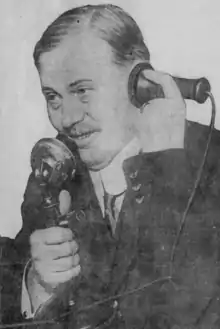Edwin T. Earl
Edwin Tobias Earl (May 30, 1858 – January 2, 1919) was an American businessman, newspaper publisher and philanthropist.
Edwin T. Earl | |
|---|---|
 | |
| Born | Edwin Tobias Earl May 30, 1858 Tehama County, California |
| Died | January 2, 1919 (aged 60) Los Angeles, California |
| Resting place | Hollywood Forever Cemetery, Hollywood, California |
| Occupation | Publisher |
| Political party | Republican |
| Spouse(s) | Emily Jarvis Earl (m. 1902) |
| Children | 4 |
Biography
Early life
Edwin T. Earl was born on a fruit ranch near Red Bluff, California on May 30, 1858.[1] His father was Joseph Earl and his mother, Adelia Chaffee.[1][2] His brother was Guy Chaffee Earl.[1]
Career
He started his career in the shipping of fruits.[1] By 1886, he was President of the Earl Fruit Company. In 1890, he invented the refrigerator car to transport fruits to the East Coast of the United States.[1][2] He established the Continental Fruit Express and invested US$2,000,000 in refrigerator cars.[1] In 1901, he sold his refrigerator cars to Armour and Company of Chicago and became a millionaire.[1][2]
In 1901, he purchased the Los Angeles Express and became its editor.[1][3] Ten years later, in 1911, he also purchased the Los Angeles Tribune.[1]
He also invested in real estate in Los Angeles.[1]
He was a Freemason, a member of the California Club and the Jonathan Club, two private member's clubs in Los Angeles, and the Bolsa Chica Gun Club.[1] He was a member of the California Republican Party.
Philanthropy
In 1901, he made a donation to the Pacific School of Religion in Berkeley, California to start the Earl Lectures.[2] For more than a hundred years, it has featured distinguished guest speakers like Theodore Roosevelt, Maya Angelou, Harry Emerson Fosdick and Cecil Williams.[2]
References
- 'Edwin T. Earl Dies in South', Sausalito News, Volume 35, Number 2, 11 January 1919
- "Pacific School of Religion: Earl Lectures". Archived from the original on August 18, 2013. Retrieved August 22, 2013.
- Kevin Starr, Inventing the Dream: California Through the Progressive Era, Oxford: Oxford University Press, 1986, p. 241